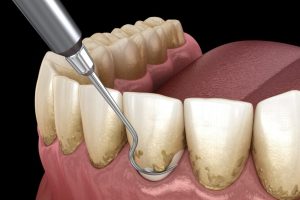
Understanding Periodontal Disease
Periodontal disease, also known as gum disease, is a chronic condition that affects the gum tissue and bone supporting the teeth. It is primarily caused by plaque buildup, which harbors bacteria that irritate and inflame the gums. If left untreated, periodontal disease can progress and result in tooth loss.
There are different stages of periodontal disease, ranging from gingivitis to advanced periodontitis. Gingivitis is the earliest stage and is characterized by red, swollen gums that may bleed during brushing or flossing. If gingivitis is not addressed, it can progress to periodontitis, where the gums pull away from the teeth, forming pockets that become infected. This can lead to bone and tissue loss, ultimately causing teeth to become loose and potentially fall out.
Early-Stage Periodontal Treatment
In the early stages of gum disease, such as gingivitis, treatment primarily focuses on professional cleaning and improving oral hygiene practices. Your dentist or oral hygienist will perform a thorough cleaning, removing plaque and tartar from your teeth and gums. They will also provide guidance on proper brushing and flossing techniques to maintain good oral hygiene at home.
It’s important to brush your entire mouth, including the gums, cheeks, tongue, and teeth. Use a soft-bristle toothbrush and replace it regularly. Gently brush the surface of your gums to remove bacteria and food particles without causing irritation. Flossing and using mouthwash are also essential to reach areas that brushing alone may miss. Consider using fluoride-based toothpaste and mouthwash to strengthen tooth enamel and promote overall oral health.
Non-Surgical Treatment Options
If gum disease has progressed beyond the early stages, non-surgical treatments may be necessary. One common non-surgical procedure is scaling and root planing. This deep cleaning treatment involves removing plaque and tartar from the tooth surfaces and smoothing the root surfaces. It helps to eliminate bacteria and promote gum reattachment.
Antibiotics may be prescribed to control bacterial infection and promote healing. These antibiotics can be administered orally, topically as a mouth rinse, or placed directly into the gum pockets. Your dentist will determine the most appropriate method based on your specific needs.
Surgical Treatment for Advanced Periodontitis
In cases where gum disease has advanced and non-surgical treatments are not sufficient, surgical intervention may be required. Flap surgery, also known as pocket reduction surgery, is a common surgical procedure used to treat advanced periodontitis. During this procedure, the gums are gently lifted, and the underlying infected tissue is removed. The remaining gum tissue is then repositioned to reduce pocket depth and promote easier maintenance.
Soft tissue grafts may be recommended if gum recession has occurred. This procedure involves taking a small amount of tissue from another area of your mouth or using donor tissue to cover exposed tooth roots. It helps to prevent further gum recession, reduce tooth sensitivity, and improve the appearance of your smile.
In cases where there is significant bone loss, bone grafting may be necessary. This procedure involves placing bone graft material in the affected area to stimulate new bone growth and support tooth stability.
Guided tissue regeneration is another surgical technique used to stimulate bone regrowth. It involves placing a special material between the existing bone and tooth to prevent unwanted tissue growth and promote bone regeneration.
Maintaining Periodontal Health
After undergoing periodontal treatment, it is crucial to maintain good oral hygiene practices and regularly visit your dentist for follow-up care. Here are some tips to help you keep your teeth and gums healthy:
- Follow a consistent oral care routine: Brush your teeth at least twice a day using a soft-bristle toothbrush and fluoride toothpaste. Don’t forget to brush your gums, tongue, and cheeks. Floss daily to remove plaque and food debris from between your teeth, and consider using interdental brushes or water flossers if traditional flossing is challenging.
- Use mouthwash: Incorporate an antimicrobial mouth rinse into your oral care routine to help reduce plaque and prevent gum disease. Consult with your dentist to choose a mouthwash that suits your specific needs.
- Attend regular dental cleanings: Schedule regular dental cleanings and check-ups with your dentist or periodontist. These appointments allow your oral health professional to monitor your gum health, remove any remaining plaque or tartar, and address any potential issues promptly.
- Maintain a healthy lifestyle: Adopting a healthy diet, avoiding smoking and tobacco use, and managing underlying health conditions can contribute to improved periodontal health.
- Stay informed and educated: Stay up to date with the latest advancements in periodontal care and oral health practices. Consult reliable sources, such as reputable dental associations and publications, for accurate and evidence-based information.
Remember, maintaining good oral hygiene and seeking regular professional care are key to preventing the recurrence of gum disease and preserving your oral health.
Periodontal disease is a serious condition that requires prompt treatment to prevent further damage to the gums and teeth. Whether you’re in the early stages of gum disease or dealing with advanced periodontitis, there are various treatment options available to save your teeth. Non-surgical treatments like scaling and root planing, as well as surgical interventions such as flap surgery and grafting procedures, can help restore gum health and prevent tooth loss.
However, treatment alone is not enough. It is essential to maintain proper oral hygiene habits, attend regular dental check-ups, and follow your dentist’s instructions for ongoing care. By adopting a comprehensive approach to periodontal treatment and maintaining good oral health practices, you can preserve your teeth and enjoy a healthy smile for years to come.
Contact us (859) 586-7900 for more information or to make an appointment!
—
 About Torbeck Dental
About Torbeck Dental
Torbeck Dental treats every patient with dignity and excellent care. We are highly trained dental professionals with exceptionally friendly and helpful service. We understand that for many, visiting a dentist can be a stressful experience so our comfortable surroundings and compassionate staff will ease any fears you may have. We are here to help you achieve your happiest and healthiest smile! Our dental team are a group of experienced professionals using the latest treatments. Our team has the professional experience to realize that there is no such thing as one-size-fits-all treatment, so we never use a one-size-fits-all approach to your dental plan. We provide quality and personalized oral health care while keeping your individuality in mind. Our goal is to improve and maintain your oral health so you can smile with confidence!
